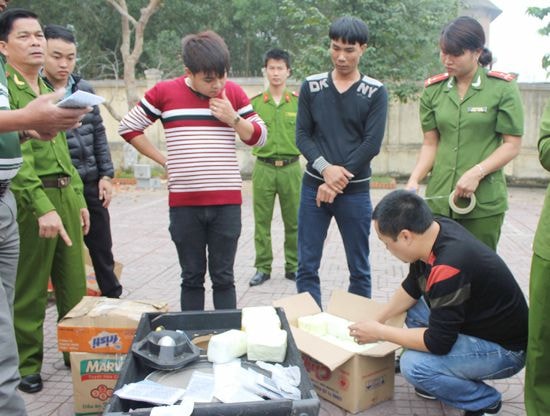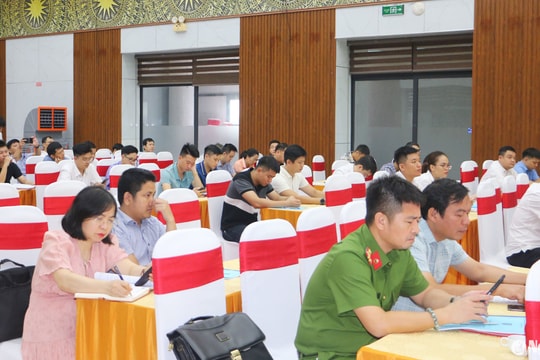Removing difficulties in judicial appraisal activities
(Baonghean) - 5 years of implementing the Government's Project 258 on Innovation and Improvement of the Efficiency of Judicial Expertise (GĐTP) activities have shown important results to better serve litigation activities and people's needs. However, reality is posing many difficulties in terms of the team of appraisers, policy mechanisms, facilities...
The results achieved...
Since 2010, the Prime Minister has issued Decision No. 258/QD-TTg approving the Project "Innovation and improvement of the effectiveness of judicial appraisal activities" (referred to as Project 258); in the past 5 years, Project 258 has been widely implemented in many fields, creating positive changes in the province. In order to effectively implement Project 258, the Provincial People's Committee has established a Steering Committee and issued timely implementation documents to enhance the capacity and effectiveness of judicial appraisal activities. The work of propagating, disseminating, educating the law, and fostering professional knowledge and skills for the team of judicial appraisers has been effectively implemented.
 |
| Police force examines seized evidence. |
From 2010 to present, the competent authorities have appraised 5,195 forensic cases, 1,147 forensic psychiatric cases, 7,095 criminal technical cases and 8 cases related to the financial - tax sector. The forensic appraisal results of forensic appraisal organizations in various fields meet the requirements of the agencies conducting proceedings to serve the investigation, prosecution, trial and settlement of cases. The appraisal ensures objectivity, accuracy, basically meets the time requirement, and there have been no complaints or denunciations related to the appraisal work.
In general, forensic examination activities basically meet the requirements of the task, contributing to effectively supporting the litigation activities, helping the investigation, prosecution and trial agencies to resolve cases accurately, objectively and in accordance with the law. In particular, for the Provincial Police, forensic examination work is identified as an important "link", contributing to opening up the direction of investigation of cases. In order to meet the requirements of forensic examination activities, the Provincial Police has developed training plans and professional training for officers and soldiers; organized the recruitment of officers who graduated from outside the field to work at the Criminal Technique Department such as: medical, chemical engineers, informatics...
Implementing the decentralization of forensic examination by the Institute of Criminal Science - Ministry of Public Security (since 2007), the forensic examination work of the Provincial Police has carried out 10/10 fields assigned by the Ministry of Public Security. Many cases from 2010 and before had to be requested to be transferred to a higher level for examination, but now have been concluded right at the locality, promptly serving the work of fighting and preventing crime, especially the application of criminal procedural measures (arrest, detention, prosecution, etc.), avoiding wrongful convictions and not missing criminals. Up to now, the Criminal Techniques Department has conducted and examined more than 8,700 cases with more than 36,350 requests in 10 fields of examination. Colonel Dau Xuan Dong, Head of the Criminal Techniques Department (Provincial Police) said: Forensic examination activities have made an important contribution to the work of fighting and preventing crime, avoiding wrongful convictions; is an effective measure to protect the legitimate rights and interests of defendants, victims, and litigants in criminal, civil, and administrative cases.
...And difficulties and shortcomings
Despite achieving important results, the work of forensic examination still faces many difficulties. As of September 2015, Nghe An province has 126 appointed forensic examiners. Most of the forensic examination activities of forensic examiners at provincial departments and branches are mainly part-time. In particular, there is a lack of forensic examiners with enthusiasm, practical experience and professional capacity working in districts, cities and towns in the province. Currently, the whole province has 4 localities: Vinh City, Hoang Mai Town, Thai Hoa Town, Dien Chau without forensic examiners, 4 districts have forensic examiners, but for various reasons, when requested, they did not perform the examination. There are many forensic examiners who have retired and transferred to other jobs but did not perform forensic examinations when requested. The foreign language proficiency of most forensic experts is still limited, making it difficult to update scientific and technical information from advanced countries.
The Forensic Center currently manages over 60 part-time forensic examiners and full-time examiners at the provincial and district levels. There are still some district hospitals that have not appointed doctors as forensic examiners. Most of the district-level forensic doctors have not been equipped with specialized equipment to serve the work of forensic examination of corpses. Some districts have forensic doctors but they take on many different jobs, so when the investigation agency requests an examination, they do not perform it, or do it slowly, affecting the investigation activities. Mr. Nguyen Quang Trung, Director of the Forensic Center (Department of Health), said: The regime and policies for district-level forensic doctors have not been fully, promptly, and adequately implemented, so they have not created dedication in their work.
In addition, although the Law on Judicial Expertise has come into effect, there are no mechanisms, policies, or solutions to promote socialization to encourage organizations and individuals to invest in the field of judicial expertise. Therefore, there is still no registered judicial expert office in the province. This is a limitation for a large area with complex criminal issues like Nghe An. Although the regime and policies for judicial expert staff have improved, they are still low compared to the current socio-economic situation, and working conditions still face many obstacles. The policy to attract doctors to work as judicial experts according to Resolution No. 34/2011/NQ-HDND and Decision No. 17/2012/QD-UBND has not yet been truly effective...
According to Ms. Nguyen Thi Que Anh, Deputy Director of the Department of Justice: Currently, the situation of disputes in relationships, transactions, and criminal acts in cases is increasing, with complex, sophisticated and serious nature, the need for judicial appraisal in litigation activities is increasing and becoming more urgent. To improve the effectiveness of this activity, it is very important to develop policies to attract people to participate in establishing judicial appraisal offices to realize the policy of socializing judicial appraisal activities. In addition, more attention should be paid to the training and appointment of judicial appraisers; strengthening specialized training on expertise and profession for local judicial appraisal officers; raising awareness of all levels and sectors about the position and role of judicial appraisal.
Nguyen Hung
Expertise is the use of knowledge, means, scientific methods, techniques, and expertise by the expert to draw professional conclusions on issues related to investigation, prosecution, trial, and execution of criminal judgments, and the settlement of civil and administrative cases at the request of the prosecution agency, the person conducting the prosecution, or at the request of the person requesting the appraisal according to the provisions of law. This activity has a decisive significance for the effectiveness and quality of the prosecution, in order to clarify the case, avoid wrongful convictions, and lack of impartiality and objectivity from the prosecution agencies. |
| RELATED NEWS |
|---|



